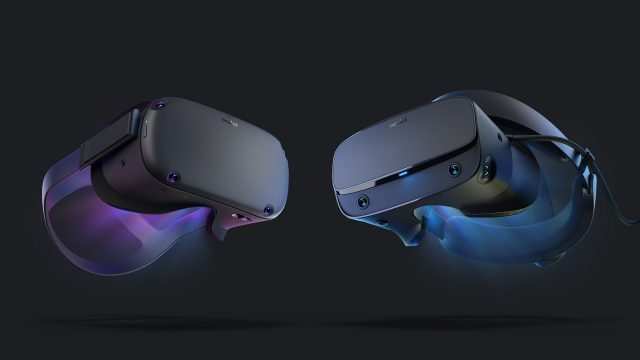Oculus today announced an upcoming PC tethering feature coming to Quest headsets in November. Oculus Link, as it’s called, will let users plug into VR ready PCs and play games originally designed for Rift. Oculus is calling it “the best of both worlds,” but then where does that leave their latest PC VR headset, Rift S?
Quest and Rift S, Oculus’ newest headsets, launched just four months ago, but it wasn’t until today that Oculus announced a PC tethering feature—something which customers had been asking about well before the launch of the headsets.
For many contemplating picking up one of the two headsets, the fundamental equation boiled down to this:
- Rift S: Costs $400; plays high-end games connected to PC
- Quest: Costs $400; plays low-end games with no PC
If you wanted the high-end experience, you’d clearly pick the Rift S. If you wanted portability and convenience, you’d pick Quest.
But today’s announcement, as near as we can tell, completely changes that equation.
- Rift S: Costs $400; plays high-end games connected to PC
- Quest: Costs $400; plays low-end games with no PC and plays high-end games connected to PC
So why would anyone buy a Rift S for the same price as Quest when the latter effectively has twice the functionality? Yes, there’s some technical differences between the headsets—the display tech is a bit different and so are the ergonomics—but hardly enough to be consequential in the face of mobile + PC functionality vs. PC-only functionality.
In fact, with Oculus Link, Oculus is calling Quest “the best of both worlds.” So… would you like ‘the best of both worlds for’ $400, or ‘not the best of both worlds’ for $400. The choice appears so obvious that the question itself seems an affront to your intelligence.
Granted, Oculus Link won’t come until November, and there’s still some unanswered questions about exactly how it will work, which could make things a little less clear-cut. But at present, our understanding is that Oculus Link will turn question into a full-fledged PC VR headset. Oculus has confirmed to Road to VR that Quest will not just be able to play the entire Rift library, it’ll be able to use all the same platform functionality that Rift uses, like Dash, Oculus Home, etc.
For the record, I think that Oculus is making the right choice for the future by making Oculus Link and Quest PC tethering a reality. That said, there’s no denying that it’s creating an awkward moment for its customers—many of whom had been suggesting all along that Quest should logically connect to PCs to no avail and then being shunted to buying a Rift S when Quest didn’t get have it at launch.
If Oculus Link really does turn Quest into a full featured PC VR headset, then who the hell is Rift S for?
Rift S already seemed like an awkward sibling rather than a proper sequel to the original Rift. Because many of the changes from Rift to Rift S felt like side-steps (or maybe even like downgrades) the Rift S wasn’t exactly an obvious upgrade for existing Rift owners.
The only reasonable strategy for Oculus from here may follow this line of thought: slash the price of the Rift S down to $300 or even $200, thereby turning it into the unassailable recommendation for anyone looking to take their first step into PC VR. And while they’re at it, Oculus might want to think of a way to compensate their loyal and enthusiastic early adopter customers who may have begrudgingly chose Rift S over Quest so that they could stay in the PC VR ecosystem, only to watch the other headset subsume that functionality a few months later.
So far, Oculus hasn’t said anything about plans to change pricing or strategy. The company tells Road to VR that it will continue to sell the Rift S, and that it is still positioning the headset as “the gold standard for performance, graphics and the most immersive VR gameplay,” but without qualifying that statement against the capabilities of Oculus Link on Quest.
Again, as we learn more about Oculus Link on the path to its November launch, maybe it’ll become more clear why someone would still want to choice Rift S over Quest, but from what the company has revealed thus far, it just isn’t clear.


